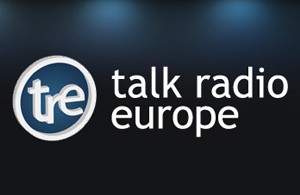Press
Adam Driver & Why We Hate the Sound of Our Own Voice (by Emma Specter)
Source: Vogue.com
“Kleinberger breaks down her “mask” model, familiarizing her audience with the three voices that most of us possess: the outward voice (which projects character and is the one others hear when we speak), the inward voice (the voice we hear when we speak), and the inner voice (what we hear when we read something silently, think, or dream)”

El Definido
¡Puede ayudar a detectar enfermedades del corazón! ¿Qué más revela nuestra voz? (by Victoria Coutts)
Source: El Definido
“La ciencia ha permitido descubrir cosas inimaginables a partir del estudio de la voz. Aquí te contamos los detalles sobre todo lo nuevo que se ha descubierto durante el último tiempo.”

Radio Interview on Talk Radio Europe
Radio Interview (with Dave Hodgson)
Source: Talk Radio Europe
“Rébecca Kleinberger studies how we use and understand our voices and the voices of others. She explains why you may not like the sound of your own voice on recordings, the differences between your outward, inward and inner voices — and the extraordinary things you communicate without being aware of it”

The Ambient
The hidden voice signals your smart speaker could be listening to (by Sophie Charara)
Source: The Ambient
“What happens when you focus on ‘everything but the words’,”

60 Minutes
Making ideas into reality at MIT’s ‘Future Factory’
Source: 60 Minutes
For more than 30 years, MIT has been recruiting people with crazy ideas to work in their Media Lab, where life-changing inventions are created. 60 Minutes got a peek at what they’re working on now

Engadget
In pursuit of the perfect AI voice (by Kevin Wong)
Source: Engadget
“How developers are humanizing their virtual personal assistants. The virtual personal assistant is romanticized in utopian portrayals of the future from The Jetsons to Star Trek. It’s the cultured, disembodied voice at humanity’s beck and call, eager and willing to do any number of menial tasks.”

Philadelphia Inquirer
Mummers and sizzling Philly cheesesteaks get their Philadelphia Orchestra moment (by David Patrick Stearns)
Source: The Inquirer

Meet the Labbers: Rébecca Kleinberger
(by Margaret K. Evens, MIT)
Source: Media Lab
In our ongoing audio series, Meet the Labbers, we hear people from all roles across the Media Lab talk about what they do and why they do it. Today, meet Rébecca Kleinberger.

The New York Times
Duet for composition and software (by Corinna da Fonseca-Wollheim)
Source: The New York Times

CRN
You Can Now ‘Paint’ Music Through Virtual Reality Technology (By Meghan Ottolini)
Source: CRN
“At a virtual reality hacking competition at MIT this week, a student-led group called Vream developed an application for HTC Vive headsets that allows users to visually compose music”

MIT News
The sound of (new) music (by Peter Dizikes | MIT News Office)
Source: MIT News Office
“To bring “Hyperstring Trilogy” back to Lucerne in 2015, a group effort was needed, Machover says. Rebecca Kleinberger, a PhD student in Machover’s research group, and Wellesley College undergraduate Galen Chuang, participating through MIT’s Undergraduate Research Opportunities Program, reconstructed the music and systems used in past performances, while 2015 MIT alumnus Kevin King helped redevelop the technology being used this year to control sensing and interaction. (“Remarkable,” Machover says of the student efforts.)”

Arts et Métiers Magazine
Sur Les Terres … (Propos recueillis par Valérie Vincienne)
Source: Arts et Métiers Magazine
“Rebecca Kleinberger à Cambridge La jeune femme de 28 ans est arrivée dans le Massachusetts en 2012 pour y poursuivre un master puis un doctorat au sein du MIT. Pour tenir le rythme de travail au sein de son unité de recherche du Media Lab, elle s’offre régulièrement des moments de détente, mais jamais bien loin du campus.”

The Boston Globe
MIT exhibits let the body hum in a vocal meditation (by By Cate McQuaid)
Source: The Boston Globe
“Singing’s potential to have healing effects, however, is within the realm of possibility. Rebecca Kleinberger, one of Machover’s research assistants, recently completed a master’s thesis at MIT on using the voice as a tool for self-reflection. In it, she writes that vibration therapies in the human vocal range have effects on chronic pain, tooth pain, circulation, and more.”

Arts et Métiers Magazine
Sur Le Vif – Rébecca Kleinberger (Li. 209), chercheuse-assistante au sein du MIT Media Lab (Propos recueillis par Christine Murris)
Source: Arts et Métiers Magazine
“Rébecca Kleinberger âgée de 26 ans, diplômée des Arts et Métiers en 2011 et de l’University College of London (UCL) en Computer Graphics l’année suivante dans le cadre du double diplôme, a été admise en 2013 au sein du prestigieux Media Lab du Massachusetts Institute of Technology (MIT). Elle y a mené à bien un master sur la voix humaine et poursuit actuellement un doctorat (PhD).”

